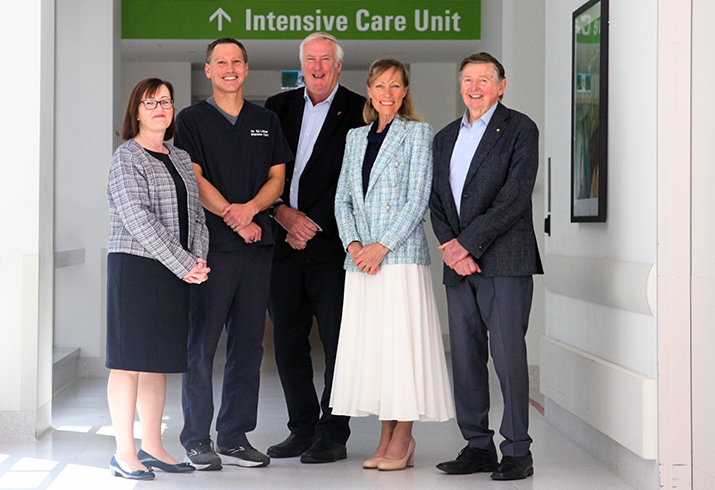ICU research study set to revolutionise care for critically ill patients
 Pictured left to right: SMHS Director Research Melanie Wright, FSH ICU Consultant Professor Ed Litton, SMHS Chief Executive Paul Forden, Tonya McCusker AM and Hon Malcolm McCusker AC KC.
Pictured left to right: SMHS Director Research Melanie Wright, FSH ICU Consultant Professor Ed Litton, SMHS Chief Executive Paul Forden, Tonya McCusker AM and Hon Malcolm McCusker AC KC.
In a world first, a research study led by the Fiona Stanley Hospital (FSH) Intensive Care Unit (ICU) has the potential to transform critical care by identifying which patients carry multidrug resistant organisms as part of their gut microbiome and are at risk of developing associated infections whilst in ICU.
Due to increased antibiotic use, ICUs are high risk environments for acquiring and spreading multidrug resistant organisms – one of the highest global public health priorities identified by the World Health Organization.
The Prospective Observational Embedded Microbiome Study, also known as POEMS, has leveraged usual care ICU practices to collect and store large scale samples from FSH ICU patients.
FSH ICU Consultant Professor Ed Litton said preliminary research suggests gut microbiome changes associated with ICU admission are profound and can drive the acquisition of multidrug resistant organisms and adverse outcomes including hospital acquired infection and increased risk of death.
“This is a world leading study – that for the first time – will give a picture of the gut microbiome of every patient in the ICU both when they are admitted and again when they are discharged,” Ed said.
“It’s unique in embedding the acquisition of samples as part of the usual care provided by ICU clinicians so that every patient contributes, and unique again by linking these samples to the electronic medical record system so that the findings can be put in context of the whole clinical picture.”
In less than two years, the POEMS has collected more than 6,200 samples making it the largest ICU microbiome biobank in the world.
Last month, the McCusker Charitable Foundation (MCF) provided a $400,000 research grant to the South Metropolitan Health Service (SMHS) that will help analyse the samples and generate new knowledge of how ICU gut microbiome changes influence outcomes, identify new targets for therapeutics, and target prevention of multidrug resistant colonisation and infection. The MCF funding will also support two post graduate students to work on the study.
Hon. Malcolm McCusker AC KC and Tonya McCusker AM this week visited the FSH ICU to see firsthand where some of the most critically unwell patients are cared for.
“It was the first time we had taken a tour of FSH and it was a great opportunity to hear from Ed who is an extremely passionate researcher with an incredible knowledge of ICU practices,” Tonya said.
“We were also able to get a better understanding of how this research study can not only benefit patients in Western Australia, but potentially change the way critically ill patients are treated across the globe.”
SMHS Director Research, Melanie Wright, said it was amazing to see the new SMHS Biobank being able to support researchers and some of the sickest patients with this groundbreaking research, and thanked the McCusker Foundation for their generous support.
Keep up to date with our news and achievements
Find out more on Facebook (external site) or LinkedIn (external site)

